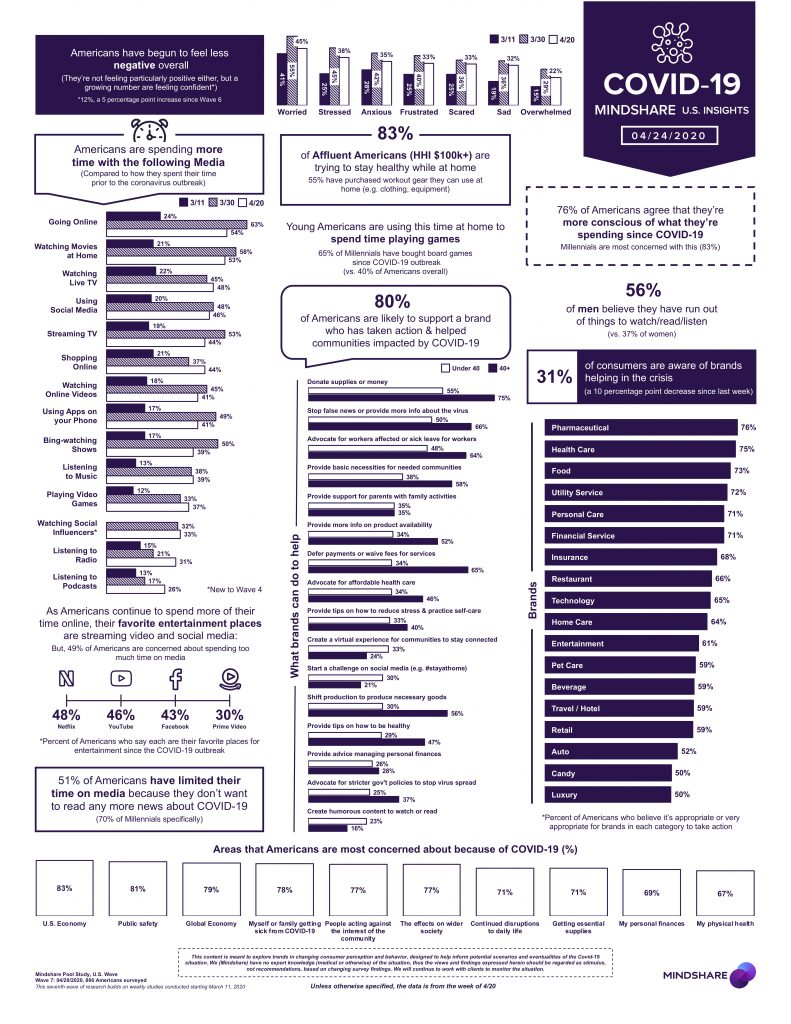28th April 2020
Wave 7: Positivity and media consumption increases
In week 7 (also known as Wave 7, W/C April 23) of our POOL survey, over 800 Americans were surveyed. We examine how COVID-19 is affecting media consumption, consumer behaviors and more.
Wave 7 has four key insights:
- Negativity is starting to dip while confidence is slowly rising, and now half of consumers feel restrictions should be lifted soon, within the month or even sooner. Concern for the health of the community and the economy still remains high. Additionally, consumers are increasingly concerned over their broader health outside of getting sick, including their time spent on media and their mental health.
- After the pandemic is over, Americans expect that they will continue to be more conscious of their hygiene and health, about how they’re spending their money, and about their larger environmental impact.
- As the economy continues to be significantly impacted by COVID-19, Americans have been reducing their spend. To save money in the future, Americans expect they are likely to cut travel, dining out, and experiences from their budgets. Essentials like food, medicine, and streaming and cable services will remain at the same spend.
- While Americans still expect brands to remain committed to help with the COVID-19 crisis, less Americans are recognizing these actions and they aren’t as top of mind. About half of Americans agree that they’re limiting they’re time with media due to a desire to avoid news about the outbreak, and local news content continue to dip as Americans turn elsewhere (e.g. drama, home).
"One of the trends we’ve seen over the course of a few weeks is news fatigue related to information about COVID-19, as just over half of consumers say that they’ve limited their time on media because they don’t want to read more news about it," explains Alexis Fragale, director of consumer insights at Mindshare USA, adding, "At the same time, people are also feeling like they’ve run out of content to read, watch, or listen to."
Alexis Fragale, Director of Consumer Insights
More takeaways and insights from MediaPost:
Excerpt: Currently, 51% of Americans say they are limiting their time with media to avoid it, which is up 38% a couple of weeks ago, and 37% at the end of March.
"One of the trends we’ve seen over the course of a few weeks is news fatigue related to information about COVID-19, as just over half of consumers say that they’ve limited their time on media because they don’t want to read more news about it," explains Alexis Fragale, director of consumer insights at Mindshare USA, adding, "At the same time, people are also feeling like they’ve run out of content to read, watch, or listen to."
Alexis Fragale, Mindshare USA's Director of Consumer Insights, says both of these trends are being driven by Millennials (70% say they are avoiding media because of COVID-19 news).
"Aligned with this, when we look at what types of media people are consuming more of since the outbreak, this week in particular we’ve seen the biggest increases in non-streaming entertainment like listening to podcasts and the radio, playing video games, and shopping online," Fragale says, adding, "In addition, this week more consumers say that they’re buying hobby-related items like arts & craft supplies, books, and board games."
Read the full MediaPost article
More data and stats:
